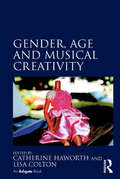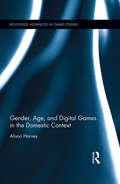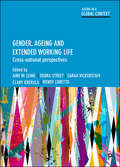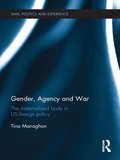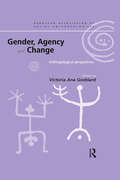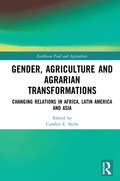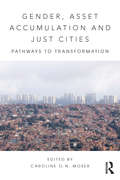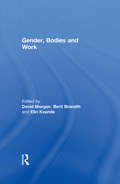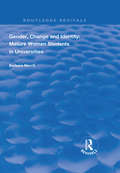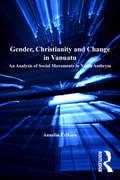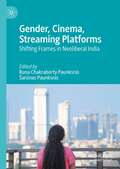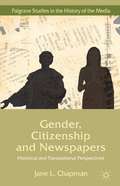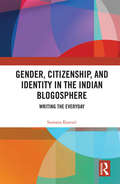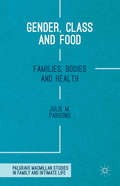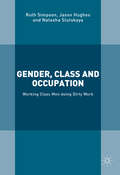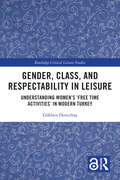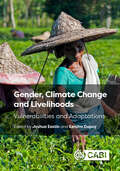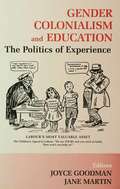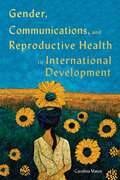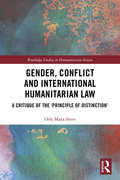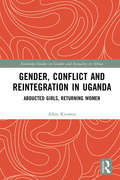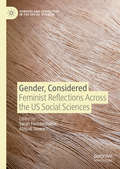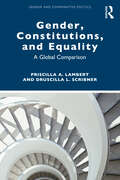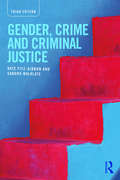- Table View
- List View
Gender, Age and Musical Creativity
by Lisa Colton Catherine HaworthFrom the perennially young, precocious figure of 'little orphan Annie' to the physical and vocal ageing of the eighteenth-century castrato, interlinked cultural constructions of age and gender are central to the historical and contemporary depiction of creative activity and its audiences. Gender, Age and Musical Creativity takes an interdisciplinary approach to issues of identity and its representation, examining intersections of age and gender in relation to music and musicians across a wide range of periods, places, and genres, including female patronage in Renaissance Italy, the working-class brass band tradition of northern England, twentieth-century jazz and popular music cultures, and the contemporary 'New Music' scene. Drawing together the work of musicologists and practitioners, the collection offers new ways in which to conceptualise the complex links between age and gender in both individual and collective practice and their reception: essays explore juvenilia and 'late' style in composition and performance, the role of public and private institutions in fostering and sustaining creative activity throughout the course of musical careers, and the ways in which genres and scenes themselves age over time.
Gender, Age, and Digital Games in the Domestic Context (Routledge Advances in Game Studies)
by Alison HarveyWestern digital game play has shifted in important ways over the last decade, with a plethora of personal devices affording a range of increasingly diverse play experiences. Despite the celebration of a more inclusive environment of digital game play, very little grounded research has been devoted to the examination of familial play and the domestication of digital games, as opposed to evolving public and educational contexts. This book is the first study to provide a situated investigation of the site of family play— the shared spaces and private places of gameplay within the domestic sphere. It carries out an empirically grounded and critical analysis of what marketing and sales discourses about shifts in the digital games audience actually look like in the space of the home, as well as the social and cultural role these ludic technologies take in the everyday practices of the family in the domestic context. It examines the material realities of video game technologies in the home; including time management and spatial organization, as well as the discursive role these devices play in discussions of technological competence and its complex relationship to age, generational differences, and gender performance. Harvey’s interdisciplinary approach and innovative methodology will hold great critical appeal for those studying digital culture, children’s media, and feminist studies of new media, as well as critical theories of technology and leisure and sport theory.
Gender, Ageing and Extended Working Life: Cross-National Perspectives (Ageing in a Global Context)
by Áine Ní Léime, Debra Street, Sarah Vickerstaff, Clary Krekula and Wendy LorettoNations that are raising retirement ages appear to work on the assumption that there is appropriate employment available for people who are expected to retire later. 'Gender, ageing and extended working life' challenges both this narrative, and the gender-neutral way the expectation for extending working lives is presented in most policy-making circles. The international contributors to this book - part of the Ageing in a Global Context series - apply life-course approaches to understanding evolving definitions of work and retirement. They consider the range of transitions from paid work to retirement that are potentially different for women and men in different family circumstances and occupational locations, and offer solutions governments should consider to enable them to evaluate existing policies. Based on evidence from Australia, Germany, Ireland, Portugal, Sweden, the United Kingdom and the United States, this is essential reading for researchers and students, and for policymakers who formulate and implement employment and pensions policy at national and international levels.
Gender, Agency and War: The Maternalized Body in US Foreign Policy (War, Politics and Experience)
by Tina ManaghanThis book traces practices of militarization and resistance that have emerged under the sign of motherhood in US Foreign Policy. Gender, Agency and War examines this discourse against the background of three key moments of American foreign policy formation: the anti-nuclear movement of the 1980s, the Gulf War of the early 1990s, and the recent invasion of Iraq. For each of these moments the author explores the emergence of a historically specific and emblematic maternalized mode of female embodiment (ranging from the ‘hysterical’ antinuclear protester to the figure of ‘Supermom’), in order to shed light onto the various practices which define and enable expressions of American sovereignty. In so doing, the text argues that the emergence of particular raced, gendered, and maternalized bodies ought not to be read as merely tangential to affairs of state, but as instantiations of global politics. This work urges an approach that rereads the body as an ‘event’ – with significant implications for the ways in which international politics and gender are currently understood. This book will be of much interest to students of gender politics, critical security studies, US foreign policy and IR in general.
Gender, Agency and Change: Anthropological Perspectives (European Association of Social Anthropologists)
by Victoria GoddardIn response to global change, people create new opportunities and conditions, and in their responses they are influenced by both gender and age. In Gender, Agency and Change the contributors illustrate the complexities involved in the constitution and performance of agency. Such agency may be reflected in strategies of accommodation and adaption that can nevertheless produce new institutional arrangements. Alternatively, they may be directed towards the outright rejection of these processes. The cases examined in this volume explore the ways in which different subjects engage in the reformulation of spaces, roles and identities, redefining the boundaries between, and the content of, the 'public' and the 'private'. The examples also provide an account of how gendered discourses are deployed to convey new meanings, a new sense of place and time, confirming or challenging ideas of 'tradition' and 'modernity'. This collection will be of particular interest to students of anthropology and gender studies.
Gender, Agriculture and Agrarian Transformations: Changing Relations in Africa, Latin America and Asia (Earthscan Food and Agriculture)
by Carolyn E. SachsThis book presents research from across the globe on how gender relationships in agriculture are changing. In many regions of the world, agricultural transformations are occurring through increased commodification, new value-chains, technological innovations introduced by CGIAR and other development interventions, declining viability of small-holder agriculture livelihoods, male out-migration from rural areas, and climate change. This book addresses how these changes involve fluctuations in gendered labour and decision making on farms and in agriculture and, in many places, have resulted in the feminization of agriculture at a time of unprecedented climate change. Chapters uncover both how women successfully innovate and how they remain disadvantaged when compared to men in terms of access to land, labor, capital and markets that would enable them to succeed in agriculture. Building on case studies from Africa, Latin America and Asia, the book interrogates how new agricultural innovations from agricultural research, new technologies and value chains reshape gender relations. Using new methodological approaches and intersectional analyses, this book will be of great interest to students and scholars of agriculture, gender, sustainable development and environmental studies more generally.
Gender, Asset Accumulation and Just Cities: Pathways to transformation
by Caroline O.N. MoserWith more than half the world’s population now living in urban areas, urbanisation is undoubtedly one of the most important phenomena of the 21st century. However, despite increasing recognition of the critical relationship between economic and social development in cities, gender issues are often overlooked in understanding the complexities of current urbanisation processes. This book seeks to rectify this neglect. Gender, Asset Accumulation and Just Cities explores the contribution that a focus on the gendered nature of asset accumulation brings to the goal of achieving just, more equitable cities. To date neither the academic debates nor the formulated policy and practice on just cities has included a focus on gender-based inequalities, discriminations, or opportunities. From a gender perspective, a separate discourse exists, closely associated with gender justice, particularly in relation to urban rights and democracy. Neither, however, has addressed the implications for women’s accumulation of assets and associated empowerment for transformational pathways to just cities. In this book, contributors specifically focus on gender and just cities from a wide range of gendered perspectives that include households, housing, land, gender-based violence, transport, climate, and disasters.
Gender, Bodies and Work
by Berit BrandthAll work is gendered and all work is embodied. Yet, in common with so many features of social life, these connections have remained largely unnoticed in most areas of social enquiry. All three topics - gender, bodies and work - have their own history and theoretical concerns and have recently showed signs of convergence. This volume recognizes this convergence and explores the inter-connections more specifically. The authors provide a set of questions which draw together themes already present in existing studies and which provide the basis for further analysis and theoretical elaboration. The chapters explore processes of embodiment and disembodiment within working settings and discuss the implications of these for the construction of gendered identities. Enhancing our knowledge of all three terms, Gender, Bodies and Work develops a perspective that has considerable potential both for assessing the past and exploring the future.
Gender, Change and Identity: Mature Women Students in Universities (Routledge Revivals)
by Barbara MerrillFirst published in 1999, this volume centres on a case study which looks at the experiences of non-traditional adult women students in universities, from the perspective of the actors. The interaction of structure and agency and the significance of macro and micro levels in shaping the behaviour, attitudes and experiences of women adult students are examined by drawing on three perspectives: feminism, Marxism and interactionism. An underlying question is to what extent did studying change the way participants perceived themselves as women? It relates life histories to their student career as individuals and collectively as subcultural groups. It also breaks new ground by including a sample of male adult students in order to compare and clarify gender issues. It also uses macro and micro sociological theories as a tool for understanding the experiences of women at university and the relationship between their public and private lives. The book concludes that studying for a degree represented an active decision to take greater control, to break free from gender and class restraints, and to transform individual lives. The study aims to clarify and reassert the radical individual traditions within sociology, feminism and adult education.
Gender, Christianity and Change in Vanuatu: An Analysis of Social Movements in North Ambrym (Anthropology and Cultural History in Asia and the Indo-Pacific)
by Annelin EriksenFocusing on cultural change and the socio-political movements in the Pacific island nation of Vanuatu, this book uses both anthropological and historical analysis to examine the way the relationship between gender and Christianity has shaped processes of social change. Based on extensive research conducted over several decades, it is one of the few books available to focus on Vanuatu and on the impact of Christianity in Melanesia more generally - as well as on the significance of gender relations in understanding these developments. Providing a model for understanding and comparing processes of change in small-scale societies, this fascinating book will appeal to scholars and students interested in the ethnography of Melanesia and in issues related to contemporary cultural change and gender more generally.
Gender, Cinema, Streaming Platforms: Shifting Frames in Neoliberal India
by Šarūnas Paunksnis Runa Chakraborty PaunksnisThis book offers interdisciplinary examination of gender representations in cinema and SVOD (Subscription Video on Demand) platforms in India. This book will identify how the so-called feminist enunciations in twenty-first century film and SVOD content in India are marked by an ambiguous entanglement of feminist and postfeminist rhetoric. Set against the backdrop of two significant contemporary phenomena, namely neoliberalism and the digital revolution, this book considers how neoliberalism, aided by technological advancement, re-configured the process of media consumption in contemporary India and how representation of gender is fraught with multiple contesting trajectories. The book looks at two types of media—cinema and SVOD platforms, and explores the reasons for this transformation that has been emerging in India over the past two decades. Keeping in mind the complex paradoxes that such concomitant process of the contraries can invoke, the book invites myriad responses from the authors who view the shifting gender representations in postmillennial Hindi cinema and SVOD platforms from their specific ideological standpoints. The book includes a wide array of genres, from commercial Hindi films to SVOD content and documentary films, and aims to record the transformation facilitated by economic as well as technological revolutions in contemporary India across various media formats.
Gender, Citizenship and Newspapers
by Jane L. ChapmanThe gendered nature of the relationship between the press and emergence of cultural citizenship from the 1860s to the 1930s is explored through original data and insightful comparisons between India, Britain and France in this integrated approach to women's representation in newspapers, their role as news sources and their professional activity.
Gender, Citizenship, and Identity in the Indian Blogosphere: Writing the Everyday
by Sumana KasturiThis book examines the role of women bloggers in the Indian Blogosphere. It explores how women use new media technologies to create online spaces that share knowledge, raise awareness, and build communities. A unique work at the intersection of digital culture, feminist theory, and diaspora/transnationalism studies, this book brings to light layered and complex issues such as identity, gender performativity, presentation of self, migration, and citizenship. This volume will be useful for scholars and researchers of cultural studies, political studies, gender studies, women’s studies, sociology, diaspora studies, feminist theory, media and communication studies.
Gender, Class and Food: Families, Bodies and Health (Palgrave Macmillan Studies in Family and Intimate Life)
by Julie M. ParsonsEveryday foodways are a powerful means of drawing boundaries between social groups and defining who we are and where we belong. This book draws upon auto/biographical food narratives and emphasises the power of everyday foodways in maintaining and reinforcing social divisions along the lines of gender and class.
Gender, Class and Occupation
by Jason Hughes Ruth Simpson Natasha SlutskayaThisinsightful new study explores an emerging and growing interest in Sociology andOrganization Studies which concerns the meanings and experiences of 'dirty'work. Based on a unique study of male streetcleaners, refuse collectors, graffiti removers and butchers, and drawing onBourdieu as a theoretical frame, it presents an 'embodied' understanding of'dirty' work. Gender, Work and Occupationexplores new avenues of workplace studies, highlighting how materialconditions both support and constrain processes of occupation-based ideologicalconstructions. Using original field research, the authors put forward adifferent agenda in terms of how we think about dirty work, and how we canexplore and understand the 'lived experiences' of dirty workers.
Gender, Class, and Freedom in Modern Political Theory
by Nancy J. HirschmannIn Gender, Class, and Freedom in Modern Political Theory, Nancy Hirschmann demonstrates not merely that modern theories of freedom are susceptible to gender and class analysis but that they must be analyzed in terms of gender and class in order to be understood at all. Through rigorous close readings of major and minor works of Hobbes, Locke, Rousseau, Kant, and Mill, Hirschmann establishes and examines the gender and class foundations of the modern understanding of freedom. Building on a social constructivist model of freedom that she developed in her award-winning book The Subject of Liberty: Toward a Feminist Theory of Freedom, she makes in her new book another original and important contribution to political and feminist theory. Despite the prominence of "state of nature" ideas in modern political theory, Hirschmann argues, theories of freedom actually advance a social constructivist understanding of humanity. By rereading "human nature" in light of this insight, Hirschmann uncovers theories of freedom that are both more historically accurate and more relevant to contemporary politics. Pigeonholing canonical theorists as proponents of either "positive" or "negative" liberty is historically inaccurate, she demonstrates, because theorists deploy both conceptions of freedom simultaneously throughout their work.
Gender, Class, and Respectability in Leisure: Understanding Women’s ‘Free Time Activities’ in Modern Turkey (Routledge Critical Leisure Studies)
by Gökben DemirbaşThis book interrogates the role of gender and class in shaping women’s everyday leisure practices. Drawing on empirical research in urban Turkey, the book explores how leisure is perceived and practised by women within their communities.The book examines the relationship of women’s leisure to their labour, women’s access to and uses of public leisure spaces, and the dynamics of their everyday sociability within their neighbourhoods. It is the first book to apply Skegg’s concept of ‘respectability’ – socially recognised judgments and standards which label the ‘right’ practices, that hold morality and power in a given context – as a theoretical tool with which to understand leisure in a country in which modernisation and Westernisation have been a central dynamic shaping political, social, and cultural life. This analysis reveals that two measures of gendered respectability – reproductive work and the honour code – and how they mediate with the classed measures of respectability, are essential to understanding women’s leisure practices in the Turkish context. The book argues that these interactions are likely shared in many Global South countries, including Islamic societies. Therefore, this analysis shines important new light on women’s experiences more broadly, and on the social, political, and cultural dynamics of traditional social structures in a modernising world.This book is fascinating reading for anybody with an interest in leisure studies, women’s studies, sociology, cultural studies, or Middle East studies.
Gender, Climate Change and Livelihoods: Vulnerabilities and Adaptations
by Margaret Alston Salim Momtaz Elizabeth Bryan Muhammad Asaduzzaman Nahid Rezwana Aden Aw-Hassan Elisabeth Garner Patricia E. Perkins Agnes Babugura Bipasha Baruah Abderrahim Bentaibi Quinn Bernier Yvonne Braun Boubaker Dhehibi Diana Hummel Zobaidul Kabir Edward Kato Francis Mwesigye Dina Najjar Balikisu Osman Elizabeth Opiyo Onyango Shahreen ShehwarThis book applies a gendered lens to evaluate the dynamic linkages between climate change and livelihoods in developing countries. It examines how climate change affects women and men in distinct ways, and what the implications are for earning income and accessing the natural, social, economic, and political resources required to survive and thrive. The book's contributing authors analyze the gendered impact of climate change on different types of livelihoods, in distinct contexts, including urban and rural, and in diverse geographic locations, including Asia, Africa and the Caribbean. It focuses on understanding how public policies and power dynamics shape gendered vulnerabilities and impacts, how gender influences coping and adaptation mechanisms, and how civil society organizations incorporate gender into their climate advocacy strategies. This book: -Provides cutting-edge scholarship on an underrepresented area of climate change: the gendered impacts of climate change on livelihoods. -Covers a range of different types of livelihoods and geographic locations. -Involves contributors from a diverse array of cultural and scholarly backgrounds, bringing contrasting perspectives to the topic. This book is recommended for scholars, students, and practitioners who study or work in fields such as climate change, gender, livelihoods, public policy, economic development, and agriculture.
Gender, Colonialism and Education: An International Perspective (Woburn Education Series)
by Jane Martin Joyce GoodmanAn examination of the ways in which gender intersects with informal and formal education in England, Germany, Indonesia, South Africa, USA and the Netherlands. The book looks at various issues including: citizenship; authority; colonialism and education; and the construction of national identities.
Gender, Communications, and Reproductive Health in International Development (McGill-Queen's/Brian Mulroney Institute of Government Studies in Leadership, Public Policy, and Governance #15)
by Carolina MatosTo this day, women globally are subjected to forms of control over their bodies, and their ability to exercise their reproductive rights in particular is still constrained. Amid a rise of challenges to the advancement of women’s rights, including the recent overturning of Roe v. Wade in the United States, sexual and reproductive health rights are at the forefront of conversations about the advancement of gender equality. To determine how communications are used strategically to shape policy, Carolina Matos explores fifty-two feminist and health NGOs from across the world and how they are improving discourse on sexuality and reproductive health in the public sphere. She investigates how these organizations are making use of communications amid various contemporary challenges, including the proliferation of misinformation about women’s rights and health in the public sphere due to the actions of oppositional far-right nationalist groups. Through original in-depth interviews within the NGOs and empirical research of the institutions’ online presences, Matos unpacks the complexities of the relationship between women’s health, communications, and development, contributing to the fields of development, health communications, and gender studies, and advancing the debate on the role of feminist NGOs in advocating for women’s rights. With a postcolonial critique of the role of NGOs in development, Matos illuminates the strategic use of communications in the mediation and advocacy of gender equality and reproductive health.
Gender, Conflict and International Humanitarian Law: A critique of the 'principle of distinction' (Routledge Studies in Humanitarian Action)
by Orly Maya SternThis book conducts a gendered critique of the ‘principle of distinction’ in international humanitarian law (IHL), with a focus on recent conflicts in Africa. The ‘principle of distinction’ is core to IHL, and regulates who can and cannot be targeted in armed conflict. It states that civilians may not be targeted in attack, while combatants and those civilians directly participating in hostilities can be. The law defines what it means to be a combatant and a civilian, and sets out what behaviour constitutes direct participation. Close examination of the origins of the principle reveals that IHL was based on a gendered view of conflict, which envisages men as fighters and women as victims of war. Problematically, this view often does not accord with the reality in ‘new wars’ today in which women are playing increasingly active roles, often forming the backbone of fighting groups, and performing functions on which armed groups are highly reliant. Using women’s participation in ‘new wars’ in Africa as a study, this volume critically examines the principle through a gendered lens, questioning the extent to which the principle serves to protect women in modern conflicts and how it fails them. By doing so, it questions whether the principle of distinction is suitable to effectively regulate the conduct of hostilities in new wars. This book will be of much interest to students of international law, gender studies, African politics, war and conflict studies, and international relations.
Gender, Conflict and Reintegration in Uganda: Abducted Girls, Returning Women (Routledge Studies on Gender and Sexuality in Africa)
by Allen KiconcoThis book explores what happened when the tens of thousands of girls (now women) abducted by Lord’s Resistance Army and inducted into their campaign of violence against the Ugandan government, returned home. Drawing on extensive original research, the author considers the challenges which the formerly abducted women have encountered upon their return, the strategies which have been used to aid their reintegration, and the enduring stigma of abduction which they continue to suffer from. The author demonstrates that ‘home’, a place of hope and comfort, can also be a hostile environment which leaves formerly abducted women in precarious and vulnerable situations. The many shortcomings in the reintegration process have serious implications for the prospects of post-conflict reconstruction. Analysing reintegration as a long-term and dynamic process which involves complex negotiations and exchanges between hosting communities and formerly abducted women, this book will be of interest to scholars, policymakers and practitioners working in the fields of post-conflict reconstruction, African politics and gender and conflict.
Gender, Considered: Feminist Reflections Across the US Social Sciences (Genders and Sexualities in the Social Sciences)
by Abigail J. Stewart Sarah FenstermakerThis book gathers reflections from 15 US based feminist social scientists about gender – as orienting framework, as one aspect of an intersectional approach, as a feature of intellectual identity, and as a problematic construct. Gender as an analytic, dynamic concept has had an important impact within and across social sciences in the past several decades. That impact for some arose in dialogue with interdisciplinary women’s studies, and was sometimes troubled both in women’s studies and in relation to other interdisciplines and disciplines. As a new generation of gender scholars embarks on their careers in social science, Fenstermaker and Stewart's collection provides scholars an opportunity to reflect on the course of different disciplinary histories and autobiographies, as well as illuminate individual scholarly craft and disciplinary direction as our understanding of gender has unfolded over time. The volume will also represent one kind of collective wisdom to inspire younger scholars.
Gender, Constitutions, and Equality: A Global Comparison (Gender and Comparative Politics)
by Priscilla A. Lambert Druscilla L. ScribnerThis book addresses whether the "gendering" of constitutions promotes women’s equality. The authors use a mixed-methods approach to explore how constitutional gender rights affect political processes and strategies, legislative and judicial outcomes, and ultimately women’s equality. They employ a cross-national study by constructing a unique database of gender provisions in over 100 countries at three points in time: 1995, 2005, and 2015. Four in-depth comparative case studies on Argentina, Chile, South Africa, and Botswana trace the complex relationship between constitutional law, strategies, and policy change in four policy areas: family law, gender-based violence, reproductive rights, and employment rights. They argue that where egalitarian constitutional provisions are present, women’s rights advocates can use them as a tool to fight gender discrimination and pursue policy changes that address gender-based power disparities. At a time when gender equality provisions are increasingly common in constitutional design, this book clarifies the mechanisms that link constitutional provisions to changes in process and outcomes while also systematically describing and analyzing the effect of gender provisions across countries and over time. Gender, Constitutions, and Equality will inform theoretical debates on gender and politics, law and social change, feminist institutionalism, and constitutional design and its effect on legislation and political strategies.
Gender, Crime and Criminal Justice
by Sandra Walklate Kate Fitz-GibbonThis book examines the relationship between gender and crime and explores both the gendered nature of crime alongside the gendered nature of criminal victimisation. Covering theory, policy and practice, this new edition has been fully revised to reflect the wider changes, development and influence of gendered thinking in these areas. It brings together a range of key issues, including: Theories and concepts in feminist criminology, Gender and victimisation, Sexual and domestic violence, Male dominance in the criminal justice system, Gendered perspectives in law and criminal justice policy. New to the third edition is increased coverage of gender and crime in international perspective, particularly within the global south, and emerging concepts of risk and security. This is essential reading for advanced courses on gender and crime, women and crime, and feminist criminology.
